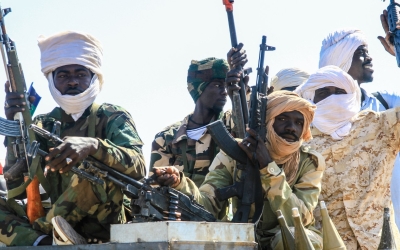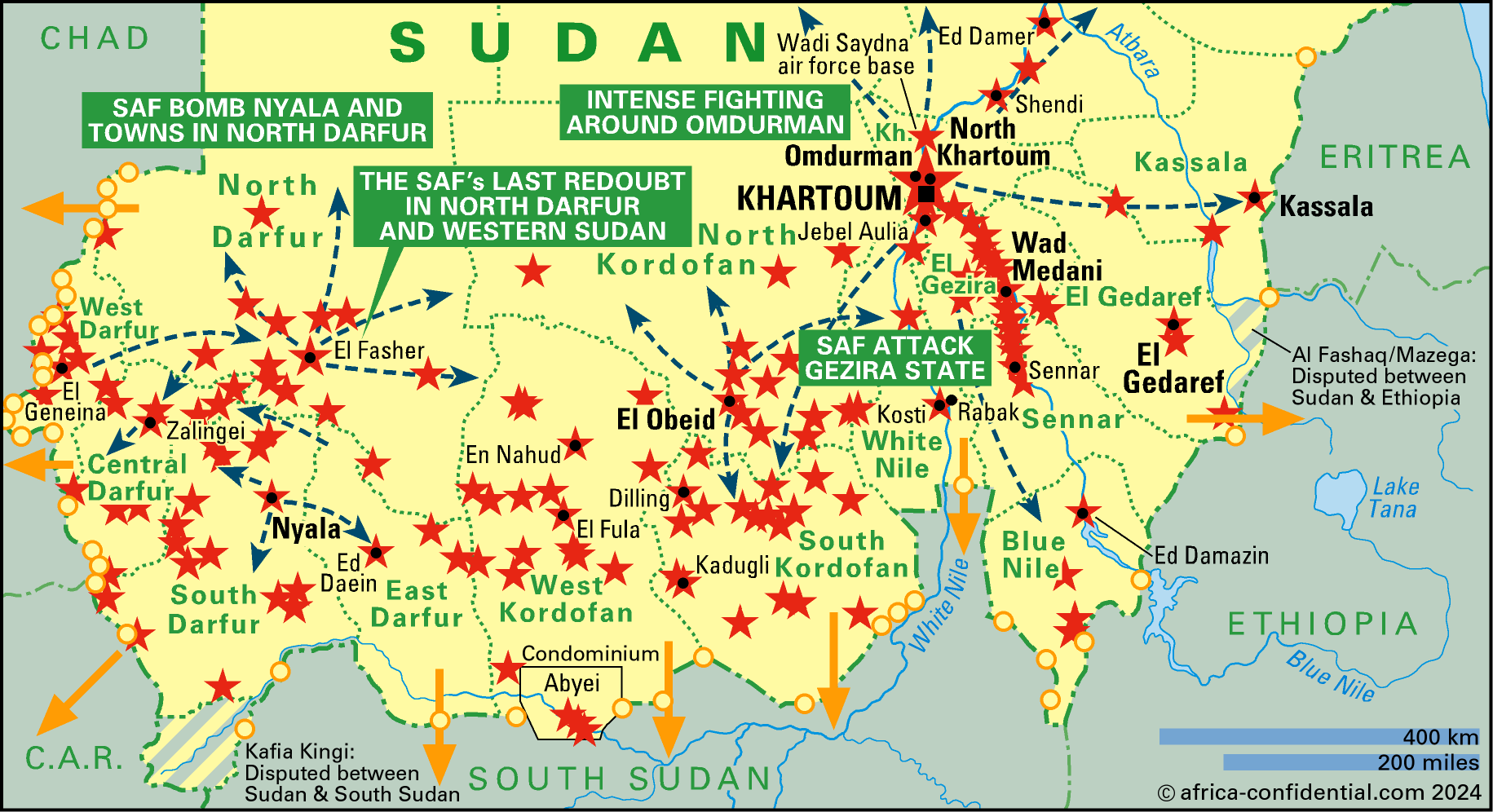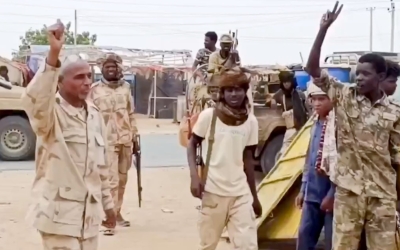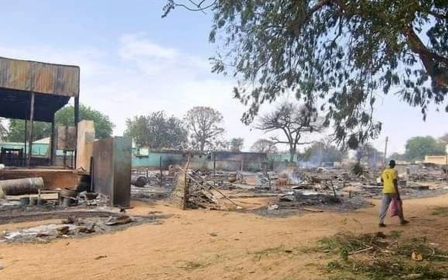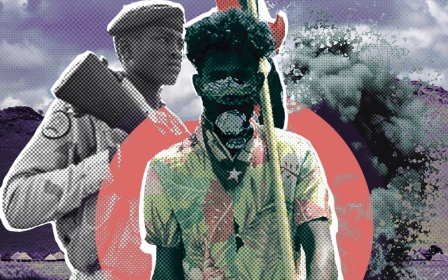Sudan war intensifies as wave of arrests hits Gedarif
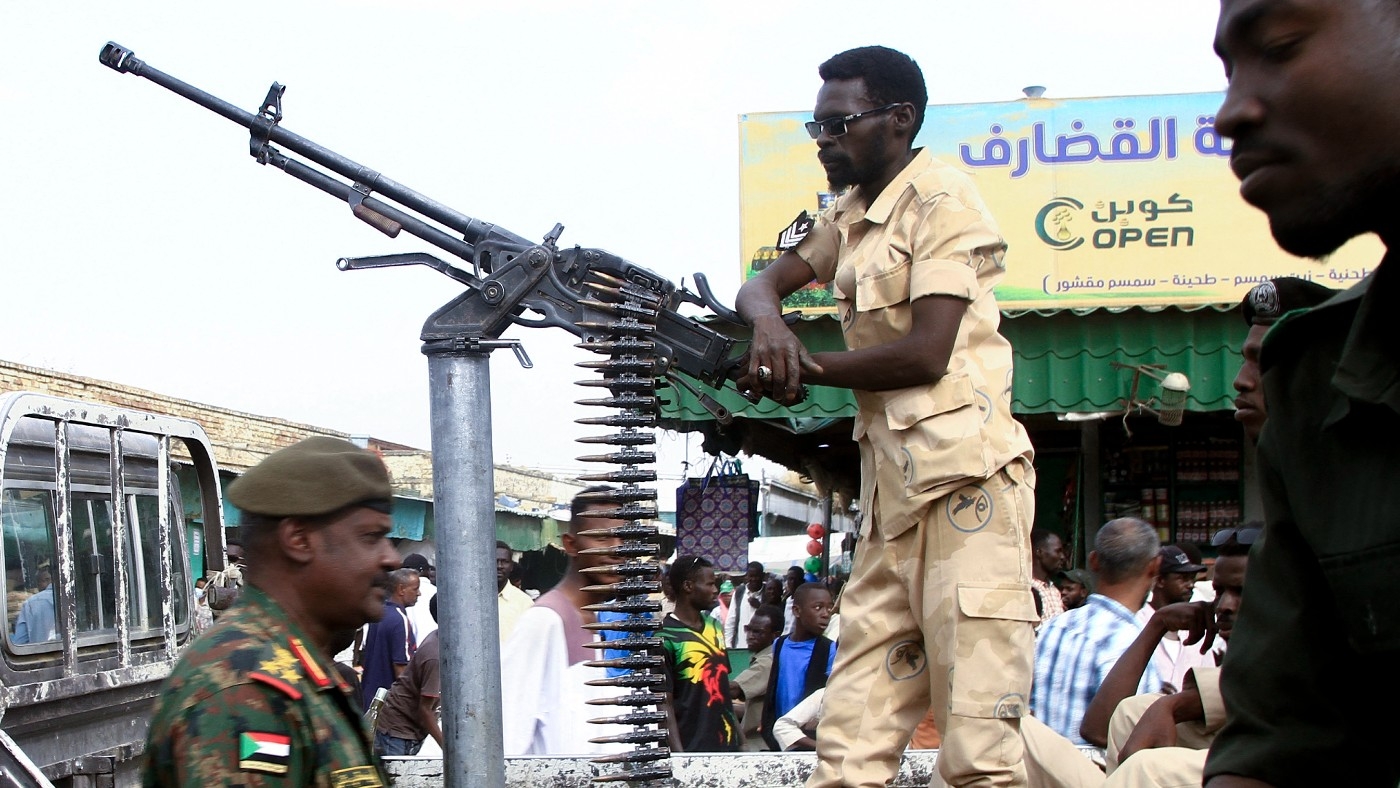
Army-aligned Sudanese security forces have carried out a wave of arrests targeting alleged Rapid Support Forces (RSF) collaborators and revolutionary activists in eastern Sudan’s Gedarif state.
At least 16 Ethiopians, most of whom are undocumented refugees, and 23 Sudanese were detained on Monday as part of an operation aimed at enhancing “security and stability” through document checks and other measures.
A local activist told Middle East Eye that, as part of a separate campaign, six of her fellow activists, four of them resistance committee members, had been arrested and are currently locked in a police station. She said that a climate of paranoia about "foreign influence" was partly the reason the Ethiopians had been targeted.
Since the war between the army and the RSF broke out on 15 April last year, many activists have been forced to flee Gedarif and the resistance committees, which are at the heart of the Sudanese revolution and which have been coordinating emergency mutual aid groups throughout the war, are no longer working in the city of Gedarif, the state's capital.
In a statement, the Sudanese Armed Forces (SAF) said that the military intelligence unit of its Second Infantry Division had, along with other security forces, “targeted several locations, markets and neighbourhoods” on Monday to “control foreign presence, review national identity documents, inspect suspected properties and conduct other security measures".
New MEE newsletter: Jerusalem Dispatch
Sign up to get the latest insights and analysis on Israel-Palestine, alongside Turkey Unpacked and other MEE newsletters
A coalition of eastern Sudanese groups said that army intelligence was "arresting everyone who asserts their right to a decent life" and was "continuing to suppress citizens and activists who call for an end to the war and the suffering of the Sudanese people". The warned that if the army did not release the activists in 72 hours, they would react.
The arrests come a couple of weeks after the approval, on 8 May, of the General Intelligence Service law (2024 amendment), which returns a wide range of powers to intelligence officers.
Those powers, which were removed in 2019 under the civilian government of Abdalla Hamdok, allow intelligence officers to gather information, summon and interrogate civilians, conduct surveillance and searches, detain suspects and seize assets, according to Sudan War Monitor.
The regulations also state that acts performed “in good faith” in the line of duty “shall not be considered a crime”, meaning that the army-aligned security forces now once again enjoy extensive immunity to prosecution.
The local activist in Gedarif described the law as reminiscent of the “dark days” of Omar al-Bashir, the autocrat who ruled Sudan from 1989 to 2019 and who was ousted following a revolution, which the activist helped lead in eastern Sudan.
Middle East Eye has reported recently on the growing influence of Bashir-era officials and of the Sudanese Islamic movement and other Islamist groups connected to his rule.
While many revolutionary activists have joined the army to fight against the RSF, ultra-conservative groups and powerbrokers once close to Bashir are also backing the army.
'Sleeper cells'
Two other residents in the city of Gedarif, which sits on Sudan’s border with Ethiopia, told MEE that there was a growing paranoia among security forces in the city about foreign influence and the presence in the east of people from western Sudan, the powerbase of the RSF.
In March, two army-aligned Sudanese officials told MEE that 50,000 foreign RSF fighters had entered Sudan since the war began. The officials said that some of them had brought their families with them.
The local activist in Gedarif said that RSF agents were present in the city, wearing plain clothes. She said that some of the recent arrests may have targeted Sudanese who looked like they were from Darfur, as has been the case in other states.
Such tactics chime with the ongoing ferocity of the fighting in Sudan, where over eight million people have been forced from their homes and tens of thousands killed since the war started over a year ago.
In el-Fasher, the capital of North Darfur, the army and its allied rebel groups are engaged in a fight to the death with the RSF, which has the city surrounded and has burned dozens of local villages to the ground.
At the end of last week, humanitarian groups told MEE they feared el-Fasher could turn into “Darfur’s Srebrenica” because the city’s civilian population, which now numbers a million, has no way out and is at the mercy of the RSF, which has committed a series of mass killings elsewhere in Darfur.
These killings were recently described as part of a "genocide against non-Arab groups" by the Raoul Wallenberg Centre.
There are three major Internally Displaced Peoples (IDP) camps in the el-Fasher area, the residents of which are in grave danger of dying of starvation, malnutrition or a lack of medicine. A local source told MEE that in one of the camps, Abu Shouk, a massacre had begun on Wednesday morning, leaving at least 13 residents dead.
In Sudan's capital, the RSF said in a statement on Wednesday that the army had struck the al-Jili oil refinery, north of Khartoum, with barrel bombs, destroying it completely. The army and its rebel allies had been laying siege to the refinery.
In Gedarif state, fighting has taken place recently in al-Faw, sending villagers in the direction of Gedarif city. While the city is over 150km from the state’s frontlines and is controlled by the army, SAF fears the presence of RSF “sleeper cells” there and worries that an attack like that in Wad Madani in December will see the paramilitary usurp it in Gedarif.
Army anti-aircraft guns in Gedarif, situated outside of the state’s conflict zones, have been called into action on multiple occasions recently to shoot down RSF drones. The RSF continues to be supplied by its main patron, the United Arab Emirates, while the army has been using Iranian drones since January.
On the other side of Gedarif’s border, in Ethiopia, thousands of Sudanese refugees are stranded having left the UN camps they were in because of inhumane living conditions, and harassment and looting by local militiamen.
“We have sought refuge in Ethiopia in search of safety, and we have no ability or intention to challenge its sovereignty,” a Sudanese refugees representative told MEE in a statement.
“We are not parties to the ongoing war in Sudan; rather, we are its victims. We respect the sovereignty of the Ethiopian state… We only ask, and continue to ask, for the protection of our lives and the lives of our children and women.”
Middle East Eye delivers independent and unrivalled coverage and analysis of the Middle East, North Africa and beyond. To learn more about republishing this content and the associated fees, please fill out this form. More about MEE can be found here.


